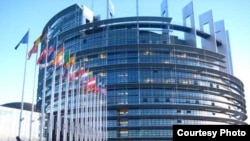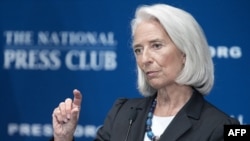WASHINGTON DC —
A delegation from the European Investment Bank (EIB) has arrived in Zimbabwe to engage the country’s industry stakeholders, on reviving the struggling manufacturing sector.
The move by the EU is seen as a response to government efforts to re-engage with the international community. However, analysts are asking if this re-engagement will resolve Zimbabwe’s economic problems.
Zimbabwe’s efforts to compete in the global marketplace, have been hampered by various obstacles, ranging from political discord; its reputation as a high country risk due to its inconsistent political and economic policies, dilapidated infrastructure and energy constraints and lack of credit, among other factors.
There is high expectation that the EU delegation’s three-day visit, will help kickstart change. The EU’s ambassador to Harare, Aldo Dell’ Arricia, says the meetings between the delegation and the country’s private and public sectors, are key to strengthening ties.
Reviving Zimbabwe’s industry is a key concern for Charles Msipa, president of the Confederation of Zimbabwe Industries (CZI).
Msipa says the manufacturing sector - operating at just 30-percent capacity, down from 39 last year, and 45-percent in 2012 – needs at least $7 billion to prevent further collapse of firms that are currently plagued by an unrelenting liquidity crunch and softening consumer demand. Estimates for the industry’s revival range between US$5 billion to US$8 billion. With the exception of some companies that have managed to retool, using funds from shareholders, or short and medium-term loans from such banks as PTA Bank and Afreximbank and others through Distressed Industries and Marginalised Areas Fund (DIMAF), a vast majority of companies have no access to funding.
Former president of the National Chamber of Commerce, Mara Hativagone, says the EU delegation’s visit to Zimbabwe is a welcome development given the state of industry.
The EU delegation’s visit is especially promising for the private sector, which has seen many of companies close, and many forced to renege on loan payments.
The visit, however, offers little benefit for the government of Zimbabwe, which is struggling to pay its workers due to the narrowing tax base. The EIB has stated that it will not extend any fresh loans to the cash strapped government which is struggling to re-pay a $300 million loan from the bank. Dell’Arricia says engaging government is not the EIB’s current priority.
Zimbabwe’s inability to pay-off its estimated external debt of $6 billion, has closed doors to international finance. Lines of credit for industry, where available, have been available on short-term basis, with punitive interest rates.
Many attribute Zimbabwe’s industry and other sectors’ collapse to the strained relations between the country and the West, over allegations of human rights and election violations, which the government has refuted and insisted is punishment for its land reform program.
Under the sanctions, targeted on President Robert Mugabe and his inner circle, donors cut out the government and channeled money to partners of their choice. The EU has since eased the sanctions, and plan to re-address the issue in November.
Chief economist Washington Mehlomakulu of Resources Exploitation Watch says he is confident ties between Harare and the EU will be normalized. Analysts say Zimbabwe’s efforts to re-engage the West, is also due to the fact that hopes of financial assistance from China and other allies, fell short. Sources say Zimbabwe has no collateral to offer China for loans and Beijing is insisting on security for its loans. But the silver lining for Zimbabwe is that the EU, the International Monetary Fund, and the African Development Bank have offered to work with Harare to rescue the country from sinking further into recession.
Despite the EU insistence on Zimbabwe repaying its loan, the African Development Bank says Zimbabwe must utilise the interim Economic Partnership Agreement it signed with the European Union to help boost exports and reduce a burgeoning trade deficit.
In 2009, Zimbabwe, together with Madagascar, Mauritius and Seychelles signed an agreement with the EU — which came into force in May 2012 — that allows the southern African countries to enjoy duty and quota free export into the EU for all products.
But the worsening economic crisis has prevented Harare from taking advantage of the deal.
The move by the EU is seen as a response to government efforts to re-engage with the international community. However, analysts are asking if this re-engagement will resolve Zimbabwe’s economic problems.
Zimbabwe’s efforts to compete in the global marketplace, have been hampered by various obstacles, ranging from political discord; its reputation as a high country risk due to its inconsistent political and economic policies, dilapidated infrastructure and energy constraints and lack of credit, among other factors.
There is high expectation that the EU delegation’s three-day visit, will help kickstart change. The EU’s ambassador to Harare, Aldo Dell’ Arricia, says the meetings between the delegation and the country’s private and public sectors, are key to strengthening ties.
Reviving Zimbabwe’s industry is a key concern for Charles Msipa, president of the Confederation of Zimbabwe Industries (CZI).
Msipa says the manufacturing sector - operating at just 30-percent capacity, down from 39 last year, and 45-percent in 2012 – needs at least $7 billion to prevent further collapse of firms that are currently plagued by an unrelenting liquidity crunch and softening consumer demand. Estimates for the industry’s revival range between US$5 billion to US$8 billion. With the exception of some companies that have managed to retool, using funds from shareholders, or short and medium-term loans from such banks as PTA Bank and Afreximbank and others through Distressed Industries and Marginalised Areas Fund (DIMAF), a vast majority of companies have no access to funding.
Former president of the National Chamber of Commerce, Mara Hativagone, says the EU delegation’s visit to Zimbabwe is a welcome development given the state of industry.
The EU delegation’s visit is especially promising for the private sector, which has seen many of companies close, and many forced to renege on loan payments.
The visit, however, offers little benefit for the government of Zimbabwe, which is struggling to pay its workers due to the narrowing tax base. The EIB has stated that it will not extend any fresh loans to the cash strapped government which is struggling to re-pay a $300 million loan from the bank. Dell’Arricia says engaging government is not the EIB’s current priority.
Zimbabwe’s inability to pay-off its estimated external debt of $6 billion, has closed doors to international finance. Lines of credit for industry, where available, have been available on short-term basis, with punitive interest rates.
Many attribute Zimbabwe’s industry and other sectors’ collapse to the strained relations between the country and the West, over allegations of human rights and election violations, which the government has refuted and insisted is punishment for its land reform program.
Under the sanctions, targeted on President Robert Mugabe and his inner circle, donors cut out the government and channeled money to partners of their choice. The EU has since eased the sanctions, and plan to re-address the issue in November.
Chief economist Washington Mehlomakulu of Resources Exploitation Watch says he is confident ties between Harare and the EU will be normalized. Analysts say Zimbabwe’s efforts to re-engage the West, is also due to the fact that hopes of financial assistance from China and other allies, fell short. Sources say Zimbabwe has no collateral to offer China for loans and Beijing is insisting on security for its loans. But the silver lining for Zimbabwe is that the EU, the International Monetary Fund, and the African Development Bank have offered to work with Harare to rescue the country from sinking further into recession.
Despite the EU insistence on Zimbabwe repaying its loan, the African Development Bank says Zimbabwe must utilise the interim Economic Partnership Agreement it signed with the European Union to help boost exports and reduce a burgeoning trade deficit.
In 2009, Zimbabwe, together with Madagascar, Mauritius and Seychelles signed an agreement with the EU — which came into force in May 2012 — that allows the southern African countries to enjoy duty and quota free export into the EU for all products.
But the worsening economic crisis has prevented Harare from taking advantage of the deal.









